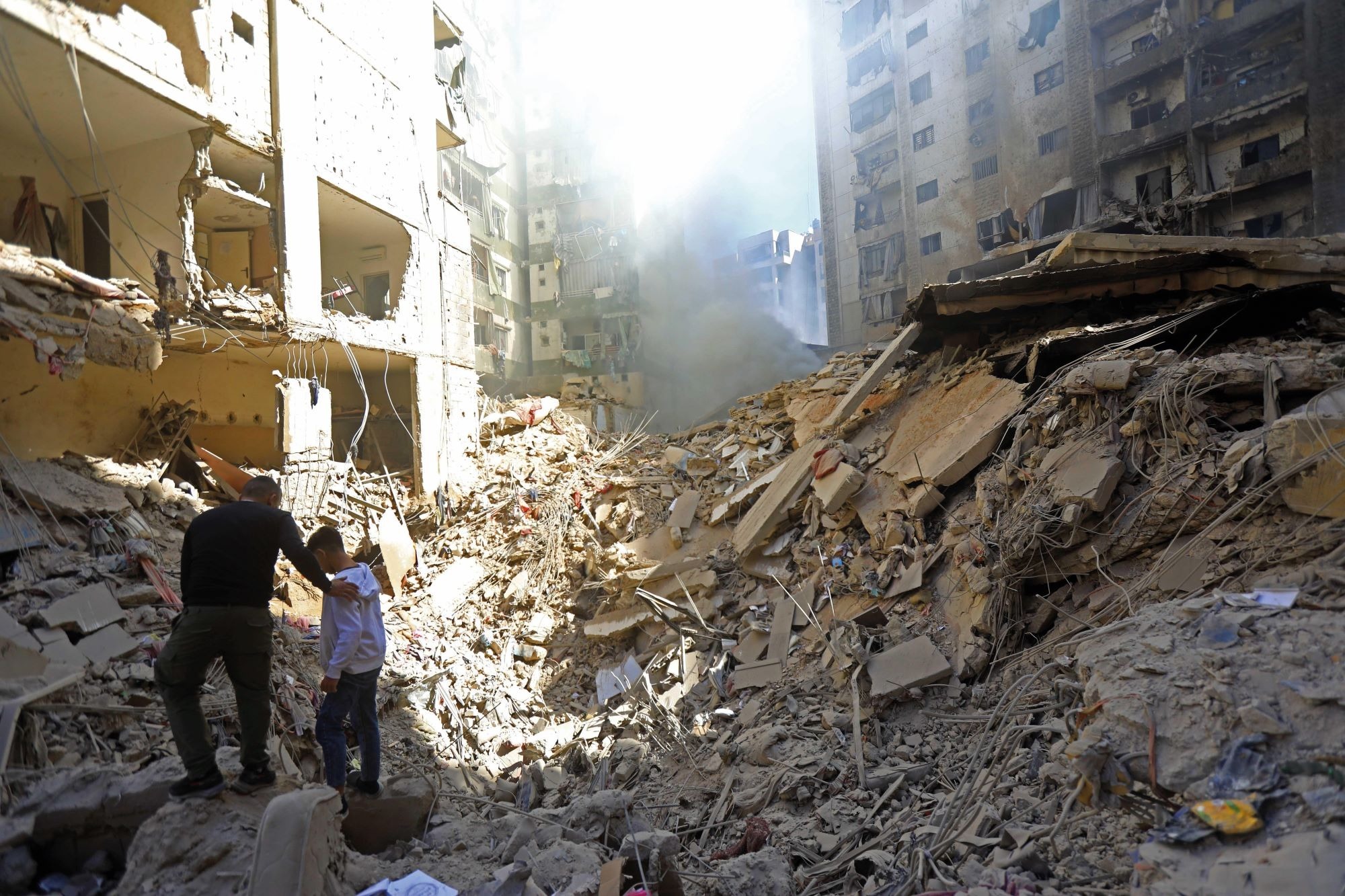Under Israel's strikes, ad hoc humanitarian organisations are springing up across the Lebanese capital

Five years ago, in the pages of New Humanist, I reported on the Beirut Marathon – an event designed to build peace in a country that had endured decades of civil war. Since then the city has lived through economic and political unrest, the Covid pandemic and the catastrophic explosion in its port in the summer of 2020. Now, with Israel launching strikes on Lebanon’s capital city, the Beirut Marathon Association (BMA) has transformed into a humanitarian organisation. Their mission is to provide support for the 1.2 million people who have been forced from their homes by the Israeli invasion and bombing campaign.
“We can’t say that we’re good, but we’re coping as much as we can,” says Anna Maria El Khoury, outreach manager for BMA. Before the conflict, El Khoury’s role had been to liaise with all the local third-party organisations involved in the marathon – schools, universities, companies, hospitals and NGOs – to help recruit runners and volunteers.
Now, her job has transformed into providing emergency humanitarian relief. When the strikes started, the BMA met with the municipality of Beirut to discuss how they could help. Usually, their meetings would be about the logistics of planning a marathon route, road closures and ensuring the smooth running of an international event. This time, city officials were looking for help in supporting the hundreds of emergency shelters they were opening in schools.
“They suggested that there’s this school, it’s about to open [as a shelter]”, El Khoury says. The school has now become a focus for BMA’s work, as they mobilised their contacts and volunteers to help – from people who could provide food and water, to teachers with the skills to work with school-age children and assess their needs.
“We started with catering to 210 IDPs [internally displaced people],” El Khoury says. That number has grown to 410, including people with disabilities, men, women and children of all ages, social classes and situations – there is even a newborn due within weeks. The Association started its work by repairing parts of the school which, like all state schools in Lebanon, have suffered from lack of funding for years. Next, they moved on to providing the basics: mattresses, blankets, food – and then on to mental health support and activities for children.
There are over 100 school-aged children in the shelter and the Association organises races, awarding medals and T-shirts to provide a distraction from the regular bombings by the Israeli military. “Every night, it’s a nightmare for them. So whenever they saw us, it was like, ‘Oh, my God, BMA is like the beacon of hope,’” El Khoury says. The Association is currently working on developing a curriculum to help children in the shelter maintain their education, with the aim of disseminating it to other shelters. Many other groups and organisations have responded to the invasion and subsequent humanitarian crisis, ranging from established NGOs to local bars and clubs.
“Everything is closed. People are scared to go out. Shops are closed. Slowly, things are starting to open. But that’s more I think, [out of] necessity,” says La’eeqa Kajee, who moved to Beirut six years ago from South Africa. She is the events manager at Aaliya’s, a book shop and bar in the city that opened up its doors to provide support. She’s also a stand-up comedian. “[Comedy] is a platform that gives people a voice to speak about what’s going on,” she says.
Kajee has been working to connect offers of help with people in need, and documenting it all on Instagram. “I’ve been running community initiatives with people that I trust, organisations that I trust, to try and fill these gaps,” she says. This involves everything from organising the delivery of bread from bakeries to a rooftop bar that is now housing IDPs, to buying mattresses, to arranging foster placements for beloved family cats.
Her current focus is hygiene packs, “the basics of sanitary pads, shampoo, razors, things like this,” she says. Her apartment is stacked with these packs ready to go out. The funding, which mostly comes from private individuals, is used to buy directly from factories and wholesalers. However, costs have increased, in part because many of these suppliers are based in the outer areas of the city – the neighbourhoods that have been most affected by airstrikes.
“Most people have either moved, if they can, with their families to the northern parts of Lebanon, to mountain houses, or family houses where they’re all together,” Kajee says. But there are still many Beirutis trapped in the city, along with migrant workers and Syrian refugees, now joined by newly displaced Lebanese people from the south of the country. “Everyone in some way, I think, is affected [by the war]. People who think they aren’t, I think are just in denial,” she says. As we speak, Kajee points out a drone that was ominously buzzing above her apartment block in the east of the city, but she is determined to stay. “This country has become my home, and it’s given me so much, I wouldn’t be able to leave it in a time of distress,” she says.
Beirut has long been a hub for NGOs, including those working with the roughly 1.5 million asylum seekers who fled the Syrian civil war. Many do not have refugee status and so are unable to leave, except to return to their home country. Some of those able to go back to Syria have done so, but for others it’s too dangerous. Baraa Seraj Aldin, who contributed to my reporting from Beirut in 2018, is one of those Syrian refugees who is now trapped in the country where he sought sanctuary a decade ago.
“Today, everyone in Lebanon is essentially a conflict-affected community,” says Naqiya Ebrahim, executive director of Seenaryo – an education, theatre and play charity that works with vulnerable people in Lebanon, Palestine and Jordan. “A huge number of our facilitators and participants have been affected [by the war]. One of our colleagues had her home destroyed just two days ago. People have had family members killed.” While half of the charity’s participants have already been displaced by the current conflict, only four per cent have received any support from the state, so Seenaryo has been focusing on providing them with the essentials – including shelter, food and cash.
Meanwhile, Lebanon’s state schools have been converted to shelters, so there is a huge need for alternative forms of education. “Teachers are still around and wanting to teach, but can’t because so many people have been displaced, and movement is so limited,” Ebrahim says. As a result, Seenaryo is using a programme developed during Covid, sending learning materials directly to parents via WhatsApp, with guidance on how to teach their children through play and a library of lesson plans.
Seenaryo is also working with shelters that need their support. In addition to a crowdfunder, they are applying for small pots of funding to expand their operations. “Literally, as the money comes in, we go [and] find the next school, we find the next shelter. It doesn’t necessarily feel hugely strategic, but it’s also just a reality of how you work in these
circumstances,” Ebrahim says.
The Beirut Marathon had been scheduled for 10 November but was cancelled. It has been replaced by a virtual race that supporters across the world can register for, with the entrance fee going to support humanitarian work in the city. Participants can run the virtual route until 30 November, using any running app to show their distance and time, which will then be officially recognised by the Beirut Marathon Association.
It’s not just a race, the BMA says, but a symbol of solidarity, resilience and the unwavering spirit of Beirut. “We’re kind of shock resistant, or trauma resistant … it’s not the first war that we’ve experienced,” El Khoury says. “It’s always like, ‘Okay, there’s war, so we’re back to relief. Where can we help?’”
Beirutis may be helping each other, but international aid is still urgently needed in Lebanon. With winter approaching, the humanitarian crisis is likely to increase – whether the war ends by then, or continues to escalate.
This article is from New Humanist’s winter 2024 issue. Subscribe now.

